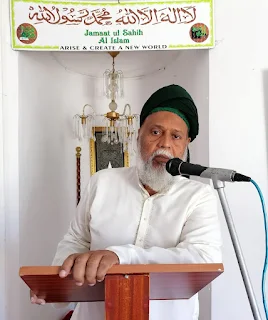Which Jihad ?
'Jihad' is a religious duty, an act of faith, prescribed by the Holy Quran
for every Muslim.
Alas, Islamic teachings are, on the one hand, so
little known by Muslims, and on the other, so vilified by
non-Muslims, that many false conceptions have settled in people’s
minds.
For
many people, it seems convenient and legitimate to cover under the
term jihad (holy war) any struggle to settle a dispute where
their interests are at stake (and thus, all means, even the most
reprehensible, seem to be good). For the non-Muslim jihad has
long been equated with the holy war against non-believers, for the
spread of Islam. It seems to me necessary - through this series of
sermons on jihad, terrorism and Islamophobia - to return to
the sources of Islam, through the Holy Quran and the traditions of
the Holy Prophet (pbuh) to explain what jihad really is, for the
objective minds.
The
term jihad is derived from jahada which means making
intense efforts to the ultimate limit (Al-Ankabut, 29:7). Jihad
is such an important injunction for Muslims that it is mentioned in
no less than 36 occasions in the Holy Quran.
Three types of Jihad
In
fact, it is of such importance that all the acts of faith prescribed
for the believer (prayer, fasting, zakah, and pilgrimage to Mecca)
are spiritual exercises designed to overcome the weaknesses of the
individual and prepare him for the accomplishment of jihad.
Jihad, as it appears from the reading of the the Holy Qur’an,
denotes three types of fighting:
The
fight against oneself (nafs).
The
fight against evil in all its forms.
Armed
combat against the visible enemy.
We
can differentiate between the three types of jihad by calling
them respectively Jihad-i-Akbar (greatest jihad),
Jihad-i-Kabir (the great jihad) and Jihad-i-Saghir
(the little/ lesser jihad). The Holy Prophet of Islam (pbuh)
considered that Jihad-i-Akbar is the supreme, noblest combat
and he said, when his troops returned from the Tabuk expedition: “You
have accomplished the minor jihad now; there remains the supreme
jihad.”
Djihad-i-Akbar:-
it is the tireless fight against oneself, against one’s bad
tendencies and inclinations. It is not therefore a fight of the State
(the Country/ State/ Government, especially the Islamic One), but a
struggle peculiar to the individual against his weak instincts/
carnal desires, such as infidelity, adultery, lies, dishonesty and
materialism. However, the State has the obligation to help the
citizen in this fight, creating the conditions conducive to his
internal purification. It is the duty of the State to rid the social
environment of any obstacle that may hinder the path of the
individual to inner purity (e.g. the sale of alcoholic beverages,
drugs, the practice of debauchery and games of chance).
The
Holy Prophet (pbuh) said, “Purity (or Cleanliness) is half of
faith.” This purity denotes the purity of the spirit. According
to my analysis, a soul encumbered with unhealthy desires remains
hermetically closed to divine grace. By purifying one’s soul of
every bad inclination, the individual accomplishes this supreme jihad
and reaches half of the faith by becoming fit to receive the grace of
his Creator and to follow the path of spiritual progress.





















